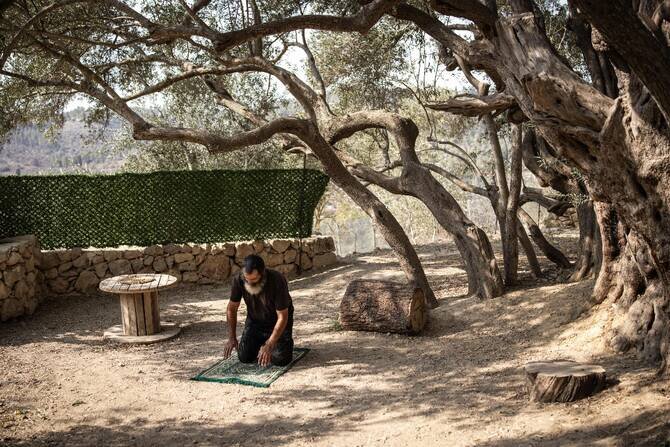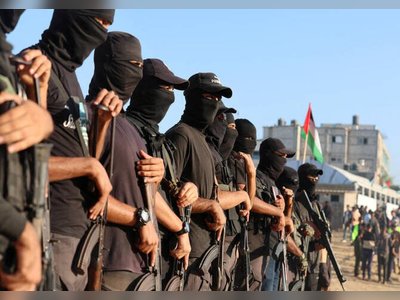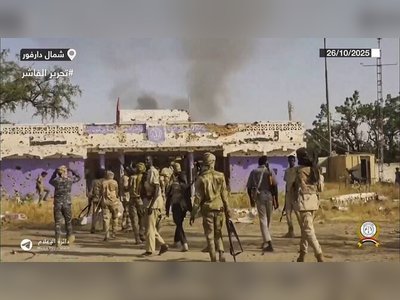
West Bank's Ancient Olive Tree: A Symbol of Endurance
The ancient olive tree, estimated to be between 3,000 and 5,500 years old, stands as a symbol of Palestinian endurance amidst the conflict-ridden West Bank.
In the village of Al-Walajah, situated south of Jerusalem in the occupied West Bank, Salah Abu Ali tends to what is believed to be the region's oldest olive tree.
This monumental tree has endured millennia of drought and war, making it a testament to history, civilization, and resilience.
Estimated to be between 3,000 and 5,500 years old, its vast trunk and dozen offshoots bear witness to its age.
Surrounded by the tree's branches, Abu Ali maintains a small oasis of calm, in stark contrast to the Israeli security wall that cuts through the land just meters away.
The wall, topped with razor wire, has appropriated more than half of Al-Walajah's original territory.
Despite this, the village has managed to avoid the settler attacks that have marred this year's olive harvest, leaving many Palestinians injured.
These attacks, almost daily since October, are documented by the Palestinian Authority’s Colonization and Wall Resistance Commission based in Ramallah.
The lack of accountability for these attacks is striking; Israeli authorities rarely hold perpetrators to account, often dispersing Palestinians with tear gas or blocking access to their own land.
In Al-Walajah, however, Abu Ali continues his guardianship undeterred.
In a good year, the tree yields between 500 to 600 kilograms of olives, but this year's low rainfall has resulted in a significantly reduced harvest.
The olive tree, with its rich oil considered 'green gold', is not just a source of livelihood for Abu Ali; it symbolizes the Palestinian people's enduring connection to their land.
Despite dwindling tourism since the war in Gaza in October 2023, visitors from around the world continue to express admiration and leave messages in a guestbook kept by Abu Ali.
The tree’s presence encapsulates the broader struggles of Al-Walajah and many other West Bank communities.
After Israel's creation in 1949, significant portions of the village's land were taken, leading many families to relocate.
The Oslo Accords further divided the territory into Areas A, B, and C, with Area C, covering 66 percent of the West Bank, under full Israeli control.
This has led to numerous issues, including home demolitions and lack of permits for construction.
Al-Walajah mayor Khader Al-Araj describes the village as a microcosm of Israel’s policies in the West Bank: settlements, walls, home demolitions, land confiscations, and closures.
Despite these challenges, Abu Ali remains dedicated to preserving the ancient tree, planting herbs and fruit trees around it and continuing its cultivation.
This monumental tree has endured millennia of drought and war, making it a testament to history, civilization, and resilience.
Estimated to be between 3,000 and 5,500 years old, its vast trunk and dozen offshoots bear witness to its age.
Surrounded by the tree's branches, Abu Ali maintains a small oasis of calm, in stark contrast to the Israeli security wall that cuts through the land just meters away.
The wall, topped with razor wire, has appropriated more than half of Al-Walajah's original territory.
Despite this, the village has managed to avoid the settler attacks that have marred this year's olive harvest, leaving many Palestinians injured.
These attacks, almost daily since October, are documented by the Palestinian Authority’s Colonization and Wall Resistance Commission based in Ramallah.
The lack of accountability for these attacks is striking; Israeli authorities rarely hold perpetrators to account, often dispersing Palestinians with tear gas or blocking access to their own land.
In Al-Walajah, however, Abu Ali continues his guardianship undeterred.
In a good year, the tree yields between 500 to 600 kilograms of olives, but this year's low rainfall has resulted in a significantly reduced harvest.
The olive tree, with its rich oil considered 'green gold', is not just a source of livelihood for Abu Ali; it symbolizes the Palestinian people's enduring connection to their land.
Despite dwindling tourism since the war in Gaza in October 2023, visitors from around the world continue to express admiration and leave messages in a guestbook kept by Abu Ali.
The tree’s presence encapsulates the broader struggles of Al-Walajah and many other West Bank communities.
After Israel's creation in 1949, significant portions of the village's land were taken, leading many families to relocate.
The Oslo Accords further divided the territory into Areas A, B, and C, with Area C, covering 66 percent of the West Bank, under full Israeli control.
This has led to numerous issues, including home demolitions and lack of permits for construction.
Al-Walajah mayor Khader Al-Araj describes the village as a microcosm of Israel’s policies in the West Bank: settlements, walls, home demolitions, land confiscations, and closures.
Despite these challenges, Abu Ali remains dedicated to preserving the ancient tree, planting herbs and fruit trees around it and continuing its cultivation.










